
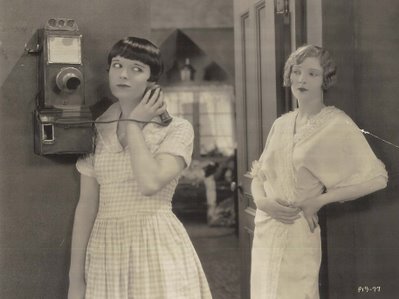
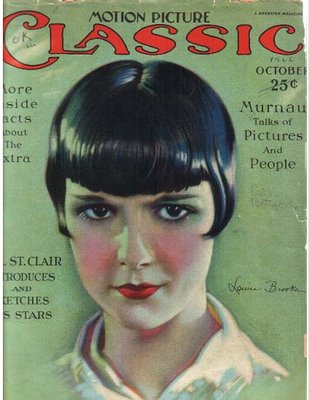
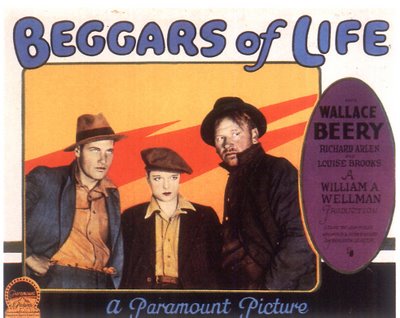 Monday Glamour Starter --- Louise Brooks
Monday Glamour Starter --- Louise BrooksThere’s a lot about Louise Brooks to appeal to the college sophomore in all of us. She spoke her mind, never suffered fools, walked out when she got bored, and so forth. She also got to be the hottest woman in the room, if not the universe, for a handful of years until that attitude of hers brought down the curtain and exiled this most self-destructive gal in the whole of American show-business to a menial life unworthy of such an instinctive acting genius. Well, there’s a mouthful, but how else do you sum up the object of such fervent cult enthusiasm? Tomorrow (November 14) is the Brooks centennial, and out in San Francisco, I understand crowds are hip-deep for any number of commemorative events. We all want to Be Louise at times --- the younger among us imagine they can --- but even Brooks found out that the path of a lifelong contrarian can be a lonely one, and I can’t imagine any of her acolytes wanting to end up the way Louise did. One thing’s sure --- she’s the blinding light among silent contemporaries whose images have not weathered the years nearly so well. You wonder what Paramount was thinking in the late twenties. Did they not have eyes to see? There was nobody like Louise. Not even Clara Bow. Maybe it’s only in hindsight that you can appreciate such a truly distinctive talent. There’s an abiding dream among fans to somehow go back in time and rescue Louise from the philistines. How could those moguls have overlooked such artistry in their midst --- especially with the looks she had?
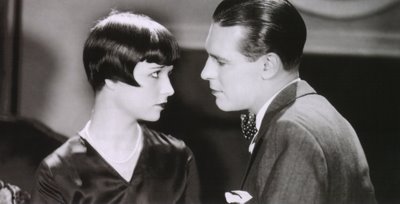
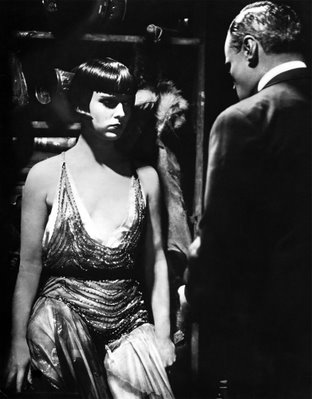
It’s good she went over and made those three European films, because without them, there’d probably be no Brooks cult. So little is left of her stateside output. You could cry looking at the list of casualties --- The American Venus, A Social Celebrity, Just Another Blonde, Rolled Stockings. Imagine a DVD box containing all these. Beyond her Pabst triumphs, we have to proceed on faith. Surviving prints of American silents are either in rough condition (Beggars Of Life), or protected by copyright (in favor of a Paramount that couldn’t care less). The Canary Murder Case is a Brooks specimen best represented by the stunning posters designed to advertise it. The movie itself ushers her on and off within the first reel, and that odd juxtaposition of mismatched shots to cover patchwork voice dubbing is distracting even when you allow for early sound crudities. This, of course, was the one that got her in Dutch with studio executives and led to permanent cast-off status (she’d refused to report back and record dialogue for the talking version). As for those Euro ventures, I’d recommend switching off the English subtitles next time you watch them on DVD. Pandora’s Box, Diary Of A Lost Girl, and Prix de Beaute are about one thing, and that doesn’t require narrative explanation beyond the picture on your screen. Every man is obsessed with Brooks, and chances are one of them will get around to killing her before the fade. That’s about all you need to know. Titles are optional. In fact, they’re in the way. Who wants to read something at the bottom of a frame otherwise filled with close-ups of Louise? You can fill in the blanks easily enough. It all comes down to a handful of interchangeable lines for whichever doomed, discarded lover happens to be addressing her --- You belong to me, My life is in ruin because of you, I’ll kill you before I’ll let another man have you. There are no language barriers between any audience and a presence so bewitching as Brooks. She needed nothing beyond that face she had. It’s as well she never made it in talkies. Dialogue would have just been an encumbrance for this actress.
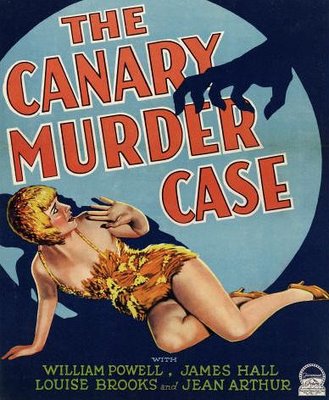

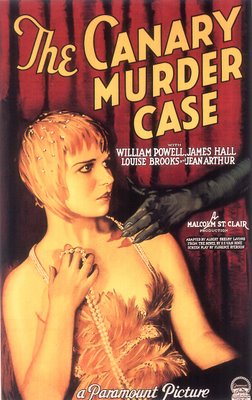
 I’d have to call hers a fragile beauty. It didn’t seem so as long as she maintained the signature jet-black flapper bob. Cutting away those bangs was like Samson shorn of his locks, however, for something of the Brooks magic went with them. A look at thirties’ portraits and those final western roles (Empty Saddles and Overland Stage Raiders) reveals a face still striking, but difficult to reconcile with the Brooks we’d known. The very idea that Louise would finish up playing support to Buck Jones and The Three Mesquiteers is pure castor oil to her admirers, for a Brooks cultist is seldom partial to "B" westerns (Bill Everson was a notable exception). Their (elitist?) disdain for humble oaters would certainly make them persona non grata at one of our Charlotte Cowboy-cons. To quote samplings of latter-day Brooks appreciations --- Nondescript "Z" western (Overland Stage Raiders), one of the most static and silly westerns in Hollywood history (Empty Saddles), and bottom-of-the-barrel westerns (both). Had she known how vexing these two would be to her modern-day worshippers, Louise might have enjoyed the experiences far beyond that measly $350 they paid. Part of the reason she ended up in such reduced circumstances was the self-destructive streak mentioned earlier, and yes, there were those who inflicted worse upon themselves, but few were so willful about it as Brooks. Part of our ongoing romance with this girl lies in the paradox of someone so intelligent and beautiful spending years holed up in a grubby apartment turning tricks and drinking toward oblivion. The Rochester rescue seems not to have improved her attitude, but maybe she sensed the needs of masochistic fans who got letters returned to sender and doors slammed in their faces. A self-described mean old lady, she seems to have worked at being just that. There were articles Brooks wrote about her career and others in biz orbits, all typically unsparing. Most regrettable was the memoirs tossed into an incinerator before they could be published. She often went beyond the truth to paint a darker image of herself, claiming drunkeness and insensibility during Eastman House screenings of her films, though curator James Card confirmed that she was totally engaged and responsive during same. There was ongoing correspondence with writers, and some fans, but a slight misstep would find that Oscar Jaffe iron door closed against further contact.
I’d have to call hers a fragile beauty. It didn’t seem so as long as she maintained the signature jet-black flapper bob. Cutting away those bangs was like Samson shorn of his locks, however, for something of the Brooks magic went with them. A look at thirties’ portraits and those final western roles (Empty Saddles and Overland Stage Raiders) reveals a face still striking, but difficult to reconcile with the Brooks we’d known. The very idea that Louise would finish up playing support to Buck Jones and The Three Mesquiteers is pure castor oil to her admirers, for a Brooks cultist is seldom partial to "B" westerns (Bill Everson was a notable exception). Their (elitist?) disdain for humble oaters would certainly make them persona non grata at one of our Charlotte Cowboy-cons. To quote samplings of latter-day Brooks appreciations --- Nondescript "Z" western (Overland Stage Raiders), one of the most static and silly westerns in Hollywood history (Empty Saddles), and bottom-of-the-barrel westerns (both). Had she known how vexing these two would be to her modern-day worshippers, Louise might have enjoyed the experiences far beyond that measly $350 they paid. Part of the reason she ended up in such reduced circumstances was the self-destructive streak mentioned earlier, and yes, there were those who inflicted worse upon themselves, but few were so willful about it as Brooks. Part of our ongoing romance with this girl lies in the paradox of someone so intelligent and beautiful spending years holed up in a grubby apartment turning tricks and drinking toward oblivion. The Rochester rescue seems not to have improved her attitude, but maybe she sensed the needs of masochistic fans who got letters returned to sender and doors slammed in their faces. A self-described mean old lady, she seems to have worked at being just that. There were articles Brooks wrote about her career and others in biz orbits, all typically unsparing. Most regrettable was the memoirs tossed into an incinerator before they could be published. She often went beyond the truth to paint a darker image of herself, claiming drunkeness and insensibility during Eastman House screenings of her films, though curator James Card confirmed that she was totally engaged and responsive during same. There was ongoing correspondence with writers, and some fans, but a slight misstep would find that Oscar Jaffe iron door closed against further contact.
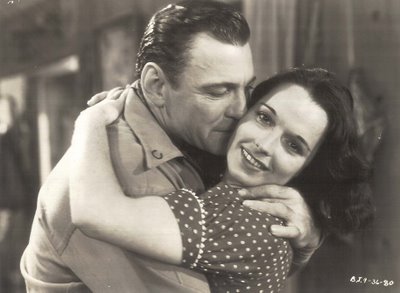
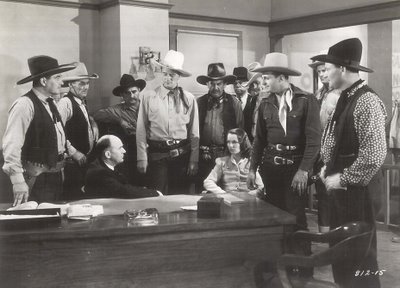
Perhaps the only thing that matters in the long run is how long you’re remembered after you’ve gone. By that criterion, Louise Brooks is perhaps the greatest of all silent stars. She’s certainly the only one to have a newly published coffee table book devoted to her, and Pandora’s Box arrives next week in a deluxe DVD package. Ebay and the Internet are a movable feast of Brooks lore and collectibles. Original images go for obscene amounts. Considering her own preference for writing in bed and avoiding face time with followers, Louise would seem destined to have administered her own website. If tomorrow were her fiftieth birthday instead of one-hundredth, imagine the lively exchanges she’d be having with safely-at-a-distance fans. Those who pen-palled with the actress during the sixties and seventies have since given way to the temptation of prices those letters can bring. I once came across an album for sale at a collector’s show with dozens of hand-written L.B. missives and fifty or so original stills besides. All this for a then (1985, the year she died) considerable price of three hundred dollars. Imagine what a return you’d have on such a puny investment in today’s burgeoning Brooks market. I understand a lot of women like Louise. You could say she struck a blow for female independence. Nobody owned her. An image like that never goes out of fashion as long as there are young people seeking the same freedom. Watching the new DVD of The Fountainhead the other day, I was struck by how much Patricia Neal’s character reminded me of the off-screen Louise Brooks. Both seemed to have been bad news for anyone who tried to get too close, though old Coop did manage to get a rope around Pat by the end of the movie. Nobody seems to have come close with Louise. Maybe that’s the real secret of her lasting appeal.